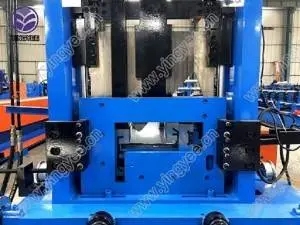
Roof Roll Forming Machine An Essential Tool for Modern Construction
In the ever-evolving world of construction, efficiency and precision are key to ensuring that projects run smoothly and deliver high-quality results. One such innovation that has revolutionized the manufacturing of roofing materials is the roof roll forming machine. This specialized piece of equipment is designed to produce metal roofing panels with remarkable accuracy and speed, making it an indispensable asset for builders and manufacturers alike.
What is a Roof Roll Forming Machine?
A roof roll forming machine is a type of equipment that converts flat metal sheets into specific shapes and profiles used for roofing. The process begins with feeding coils of metal into the machine, where it is precisely shaped through a series of rollers. These rollers gradually transform the flat sheet into the desired contour, which is then cut to length. This method allows for the production of various roofing profiles, including standing seam, corrugated, and tiles, to meet a wide array of architectural designs.
Key Features and Benefits
1. High Efficiency One of the primary advantages of roof roll forming machines is their ability to produce roofing materials quickly. The automated process can significantly reduce labor costs and production time, making it possible to generate large quantities of roofing panels in a short period.
2. Consistent Quality The machine's high level of precision ensures that each panel produced meets strict quality standards. This consistency reduces waste and rework, allowing construction projects to stay on schedule and within budget.
3. Versatility Roof roll forming machines can be customized to produce different profiles and materials, such as galvanized steel, aluminum, and copper. This versatility enables manufacturers to cater to diverse market needs and client preferences.

4. Reduced Labor Costs By automating the manufacturing process, roof roll forming machines minimize the need for extensive manual labor. This not only cuts costs but also reduces the risk of human error, resulting in more reliable production outcomes.
5. Space-Saving Design Many modern roll forming machines are designed to be compact, making them suitable for small manufacturing environments or sites. Despite their size, they offer advanced features that enhance operational efficiency.
Applications in Construction
Roof roll forming machines play a crucial role in various construction applications. They are widely used in residential, commercial, and industrial projects. From manufacturing roofing panels for warehouses and factories to producing aesthetically pleasing designs for homes, these machines provide solutions that meet the diverse requirements of the construction industry.
Moreover, with the increasing emphasis on sustainable construction practices, metal roofs produced by roll forming machines are becoming increasingly popular. Metal roofing is not only durable and low-maintenance but also recyclable, contributing to environmental sustainability.
Conclusion
In summary, the roof roll forming machine is a vital instrument in modern construction, offering numerous benefits that enhance efficiency, precision, and versatility in the manufacturing of roofing materials. As construction continues to advance, the adoption of this technology will likely expand, paving the way for innovative building designs and sustainable practices. With the ability to produce high-quality roofing panels quickly and reliably, roof roll forming machines are set to remain a cornerstone of the construction industry for years to come. Whether for new builds or renovations, these machines are indispensable in shaping the future of modern architecture.